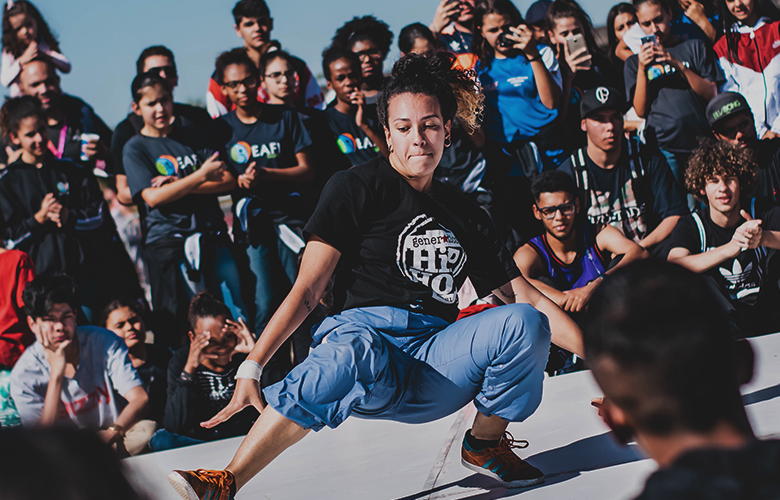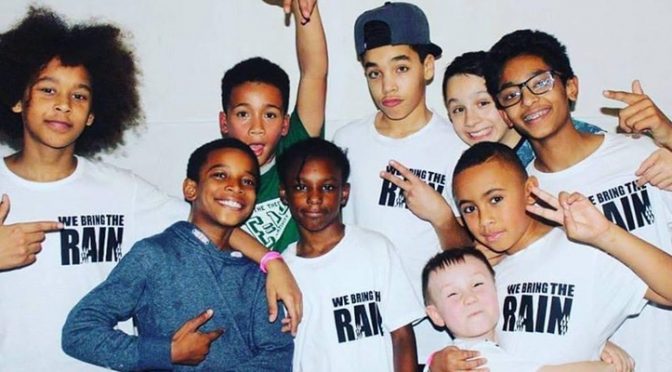
London has been experiencing a rise in violent crime, in just 5 years the homicide rate has increased by 50%. I am confident this increase, particularly the increase in knife crime, is directly related to the closure of youth centres and community projects, the rising influence of pressure through social media and the fact that there are 22,000 fewer policemen on the streets of England compared to last year.
The critically acclaimed documentary ‘The Interrupters’ by Steve James, tells the story of the plague of violence Chicago was dealing with in 2011. The organisation Cure Violence used youth workers to stop the spread of that violence with strategies more usually associated with disease control such as detecting and interrupting conflicts, identifying high-risk individuals, and changing social norms. This project resulted in a 70% reduction in violence and a fundamental positive influence on individual lives of young people in Chicago.

Rain Crew is testament to this ‘Interrupter’ method. As residents of East London, dance provided a path away from violence for many of our members. Now, as leaders within the dance community, those members have become mentors, opening a path to safety and independence for children and young adults at risk of becoming involved in violence, gangs or drugs. Most of Rain Crew’s dancers have been introduced to Breaking and HipHop via workshops in youth centres and after school clubs, and have now created sustainable careers within the arts.
Through our classes and events, we established ways to reach out to young, at-risk individuals and have witnessed the positive impact of our work on our students who have become active members within the dance scene. They fill their social media pages with footage of their dance, form new friendship groups with like-minded kids and young adults with similar passions and follow other dancers on Instagram. This completely transforms their feeds and shifts their intake of information. Where Instagram was once used to brag and taunt one another, contributing to the rise of gang related crimes, for some it is now a platform filled with positive role models.
It is a well-known fact that cultural spaces create safer cities yet London has been dealing with an incredible amount of closures of youth centres, community projects and after school clubs. Still our government is not linking these closures and the large increase of violence as cause and result, so the cutting continues.
Opportunities are taken away from those that need it the most, turning sports and the arts into a luxury service. Most dance or arts projects now are distracted by meeting demanding funding targets rather than effecting meaningful change. The real impact of these closures and cuts and therefore absence of positive role models will not be known for years and years to come. It will take a long time before the qualitative impact of HipHop dance can be fully realised and evaluated. I can’t overemphasise the challenge of quantitatively measuring a negative – like the absence of violence – while maintaining the focus on the individual lives of targeted young people.
Myself and Rain Crew are committed to continue to create accessible opportunities. Being a dance crew and company located in East London we are constantly reminded of the importance of the work we do and how easy it is for children and young people to pursue a path of violence when they can’t see a way out. The youth centres that are still open deal with massive money and staff shortages decreasing the safety of these rare spaces. One of our members is a manager of a youth centre and constantly deals with fights, stabbings and even deaths while desperately trying to create better and safer lives for these children. She is increasingly struggling to provide positivity due to lack of time, money and help. The staff of these youth centres, youth workers and community leaders are in my opinion the heroes of our time, selflessly fighting for our future generation.
There are various ways to positively influence the lives of individuals at risk; cultivating personal tools and values such as motivation and goal orientation and showing them a positive use of time such as sports or extra-curricular activities (McMillan and Reed, 1994). Dance meets these objectives and has already made an enormous impact on the lives of many. Young people relate to HipHop in all its forms, it’s their voice forever changing and adapting to the trials and tribulations of each generation. But because there is hardly any data, reports and studies on HipHop dance and its impact on the community, it is not seen as a viable solution to those not there to witness it in full swing. HipHop dance is deemed unworthy of big stages, funding and recognition yet our ability to capture an actual diverse audience of kids and young adults including those at risk is second to none.
Identifying at-risk youth is not easy but we know that factors such as mental health issues, economic disadvantage, being in care, having learning disabilities or being a member of minority ethnic groups (not because they are members of minority ethnic groups but because these groups are often excluded from society) increase a child’s chance of becoming involved in violence. With this information in mind we can change the way we interact with the children and young people we see in our classes and events and give extra attention where needed.
Being able to identify at-risk individuals is an important first step into tackling this multifaceted problem. We, industry leaders within the HipHop dance scene, need to come together and create an army of mentors, showcasing a substitute for violence and start noting down and highlighting our wins and successes for the world to see. We can’t sit down quietly and just accept these cuts. The cuts in our funding and the cuts in our children. Through teamwork and partnerships, we can and must offer a viable alternative.
It’s a Condition, Not a Competition
Perfectionism: A Dancing Crisis


Maren is a creative and driven producer with a proven track record of designing, developing and delivering innovative and high-quality dance and arts projects. She is dedicated to developing strong leaders, creating opportunities and making the arts accessible to all. As an activist for social change, Maren keeps inclusion at the forefront of all her work.
Read Full Profile© 2021 TheatreArtLife. All rights reserved.

Thank you so much for reading, but you have now reached your free article limit for this month.
Our contributors are currently writing more articles for you to enjoy.
To keep reading, all you have to do is become a subscriber and then you can read unlimited articles anytime.
Your investment will help us continue to ignite connections across the globe in live entertainment and build this community for industry professionals.